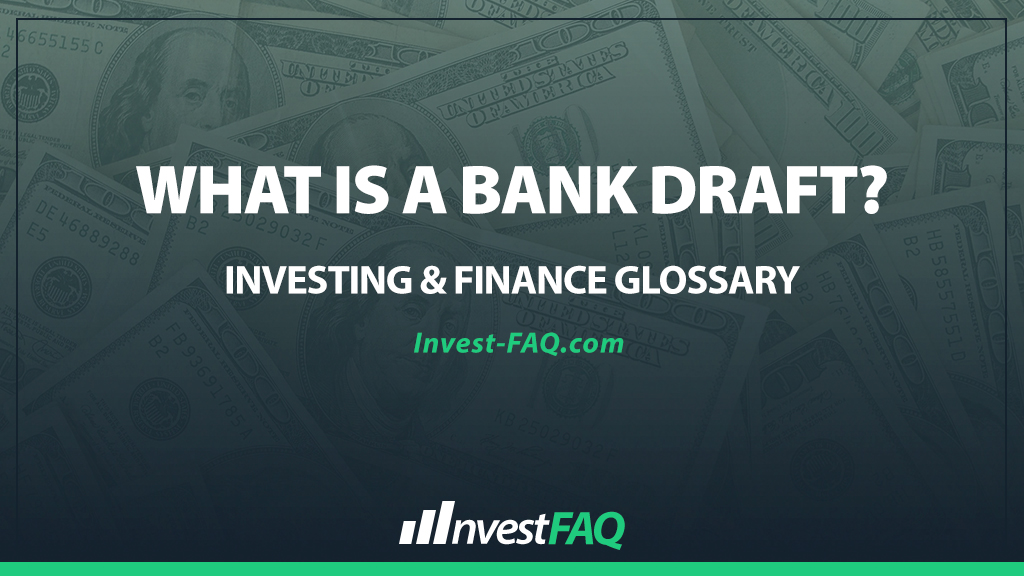
Bank Draft
Contents
A bank draft is a payment instrument issued by a bank on behalf of a payer, guaranteeing payment of a specified amount to a named beneficiary. It represents a secure form of payment, as the funds are drawn directly from the bank’s reserves, ensuring the recipient that the draft will not bounce due to insufficient funds.
In the business world, bank drafts are commonly used for significant transactions where the security of payment is paramount, such as purchasing real estate, high-value goods, or settling large invoices with suppliers.
Unlike personal checks, the assurance of payment with a bank draft reduces the risk of non-payment, fostering trust between parties in major transactions.
Businesses prefer bank drafts for their reliability, especially in international trade, where they help to mitigate risks associated with currency fluctuations and non-payment.
Example of a Bank Draft
Suppose “Global Imports Ltd.” purchases $50,000 worth of inventory from an overseas supplier. To secure the payment, Global Imports obtains a bank draft from its bank, which charges a $50 fee for issuing the draft. Global Imports records the transaction as follows:
Inventory (Asset): Increase by $50,000
Cash (Asset): Decrease by $50,050
Bank Service Charge (Expense): $50
In this scenario, “Global Imports Ltd.” uses a bank draft to ensure the payment to its supplier is secure and reliable, reflecting a commitment to fulfilling its payment obligations.
The accounting entries show an increase in inventory, reflecting the acquisition of new goods. The cash account is reduced not only by the cost of the inventory but also by the bank’s service charge for issuing the draft, accurately capturing the outflow of funds related to this transaction.
The bank service charge is recorded as an expense, recognizing the cost incurred to facilitate this secure form of payment.
Significance for Investing & Finance
The concept of a bank draft holds significant importance in accounting for several reasons:
Enhanced Payment Security: Bank drafts provide a higher level of security compared to personal checks or cash, reducing the risk of fraud and ensuring that funds are available for the transaction.
International Trade: They are particularly valuable in international transactions, offering a reliable method of payment that can help businesses navigate the complexities of foreign trade.
Accurate Financial Records: The use of bank drafts necessitates precise accounting entries that reflect the true cost of transactions, including any associated fees, thereby ensuring that financial records accurately represent the company’s financial activities.
In summary, a bank draft is a crucial financial instrument in the business landscape, offering a secure and dependable method of payment for significant transactions.
Its use underscores a company’s commitment to reliability in financial dealings, while its accounting treatment ensures transparency and accuracy in financial reporting.
FAQ
What makes a bank draft more secure than a personal check for large transactions?
A bank draft is more secure because the funds are drawn against the bank’s own reserves, ensuring the recipient that the payment is guaranteed, unlike a personal check which relies on the payer’s account having sufficient funds.
Are there any fees associated with obtaining a bank draft, and if so, who typically pays them?
Yes, banks typically charge a fee for issuing a bank draft, and it is usually the responsibility of the payer to cover this cost as part of the process of obtaining the draft.
Can a bank draft be cancelled or stopped once it has been issued?
Cancelling a bank draft is generally more complicated than stopping a personal check because it is guaranteed by the bank, and it usually requires the purchaser to prove that the draft was lost, stolen, or destroyed.
How long does it take for a recipient to access funds from a bank draft?
Funds from a bank draft are typically available to the recipient faster than a personal check due to the pre-verification of funds by the bank, although processing times can vary by institution.
